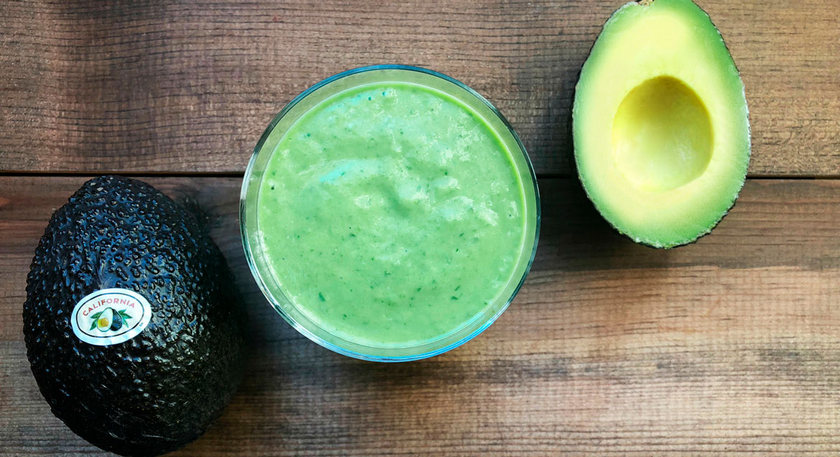
As with all fruits and vegetables, wash avocados before cutting. Check out our tips for how to choose and use California Avocados
Disclosure: I am a spokesperson for the California Avocado Commission. Opinions are my own.
As with all fruits and vegetables, wash avocados before cutting.
Check out our tips for how to choose and use California Avocados.
Elite athletes are constantly putting in the work on the slopes and on the ice; however, it’s often forgotten that what you do in the kitchen is just as important as all the grueling hours you focus on training. Fueling your body so you can train your best will help prepare you for the ultimate day of competition, the day when a hundredth of a second can be all that separates a champion from a runner-up.
As a sports nutritionist for over 20 years, I’ve had the unique opportunity to work with professional and elite athletes from many sports. The great news is the focus on fueling athletes has never been stronger than it is today. More and more professional and collegiate athletic programs are hiring board-certified sports dietitians to make sure their athletes are putting high-quality fuel into their personal “gas tanks.” Below, I share my top five ways to eat to maximize your performance, along with three recipes I developed partnering with the folks at the California Avocado Commission. While creating these recipes, I focused on creating tasty, nutrient-rich creations that are quick and easy to make.
Five Ways You Can Eat to Compete
1. Hydration
Proper hydration should begin long before an athlete steps out to train or compete, as you should always be well-hydrated when you start exercising. Typically, your body is about 60 percent water, and to keep your body performing at its peak, proper water intake is essential. A mere 2 percent loss in total body water can negatively impact performance. In general, for pre-exercise hydration, an athlete needs to consume 16 fluid ounces of water or a sports drink before exercise and an additional 6 to 8 fluid ounces of water or a sports drink after exercise. Replace fluids during exercise to promote adequate hydration. Drink water rather than pouring it over your head. Drinking is the only way to rehydrate and cool your body from the inside out. Sports drinks are more appropriate than water for athletes engaged in moderate- to high-intensity exercise that lasts an hour or longer. Rehydrate after exercise by drinking enough fluid to replace fluid losses during exercise.
2. Fuel Up with Carbs
Elite athletes burn so many calories that they must make sure they are getting plenty of carbs to help fuel their muscles for optimal performance. The body is able to process and utilize carbohydrates most readily for energy, so focus on consuming whole grains, beans and fruits prior to exercise for lasting energy. Your carbohydrate needs will depend on the type of training you are doing. Recommended amounts of carbohydrates: include*:
Moderate duration and low intensity: 2.3 to 3.2 grams per pound
Moderate- to heavy-training load and high intensity: 3 to 4.5 grams per pound
Extreme training and high-intensity races (longer than 4 to 5 hours): > 3.6 to 5.5 grams per pound
*Source: Academy of Nutrition and Dietetics. Eatright.org
Here’s a recipe I created that works as an easy side salad and is loaded with great carbs and protein from the beans and healthy fats from the California Avocados.
Quick Tip: Did you know that research has shown that avocados can act as a “nutrient booster” by helping to increase the absorption of fat-soluble nutrients such as vitamins A, D, K and E?
California Avocado Pineapple Recovery Smoothie Recipe
This quick and easy post workout recovery smoothie could also be called a nutrient-packed “recovery smoothie” as it provides good source of fiber (18% DV) and (15% DV) potassium, an essential dietary mineral and electrolyte that helps your nerves function and muscles to contract. For athletes, fluids and electrolytes are recommended before, during and after exercise to sustain total body water. This tasty treat also provides and 90% DV vitamin C and 20% DV calcium to help your body recover.
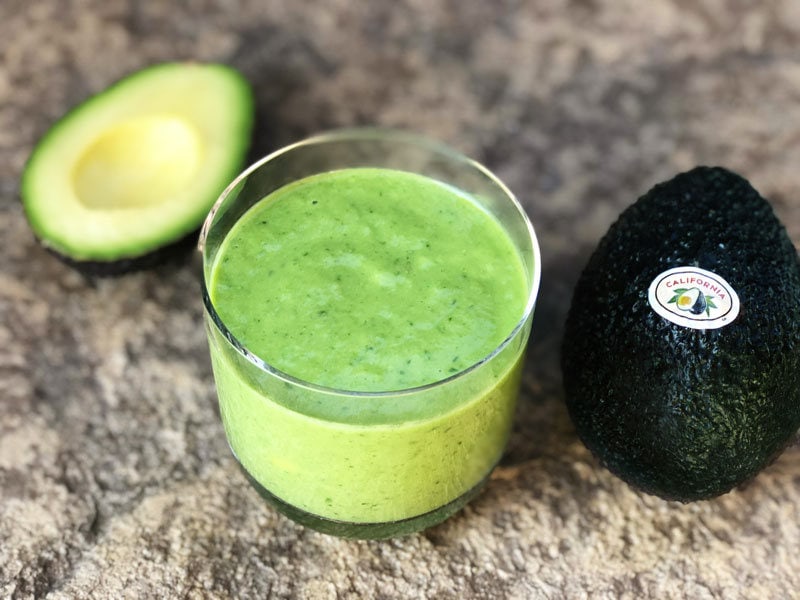
Nutrition Attributes Highlights:
- Trans Fat Free
- Low Sodium
- 16% DV Protein
- Good Source of dietary fiber (18% DV), folate (15% DV), vitamin B1 (15% DV), vitamin D (10% DV), iron (10% DV) and potassium (15% DV)
- Excellent Source of vitamin B5 (20% DV), vitamin A (25 % DV), vitamin B2 (30% DV), vitamin B3 (20% DV), vitamin B6 (20% DV), vitamin B12 (40% DV), vitamin C (90% DV) and calcium (20% DV)
3. Protein Power
Protein is crucial for building muscle and recovery. Depending on the type of training, athletes want to aim for about 0.55 to 0.8 grams of protein per pound of body weight for light to moderate training. * Some great protein sources are fish, chicken, beans, lentils, eggs, cottage cheese and milk.
4. Recovery Rocks
Proper recovery is the secret weapon for peak performance. When you focus on recovery nutrition, you will be able to optimize your next workout, which is so important to truly reach your full potential. It’s imperative to replenish nutrients lost by eating carbs and protein within 15 minutes after an intense workout. This helps rebuild and repair your muscles.* The body works hardest to rebuild the broken-down muscle tissue in the 20 minutes following a workout. Using this window of time to consume liquid nutrition with carbs, protein and healthy fats will give your body the best chance of absorbing nutrients to aid in muscle recovery.
Quick Tip: An easy way to boost the protein content in your recovery smoothie is to use milk and/or add a scoop of protein powder to them.
California Avocado White Bean Salad Recipe
This vegan salad is an excellent source of dietary fiber (29% DV), folate (30% DV), vitamin B5 (20% DV), vitamin B3 (20% DV), vitamin C (20% DV), iron (20% DV) and potassium (20% DV) and a good source (18% DV) protein.
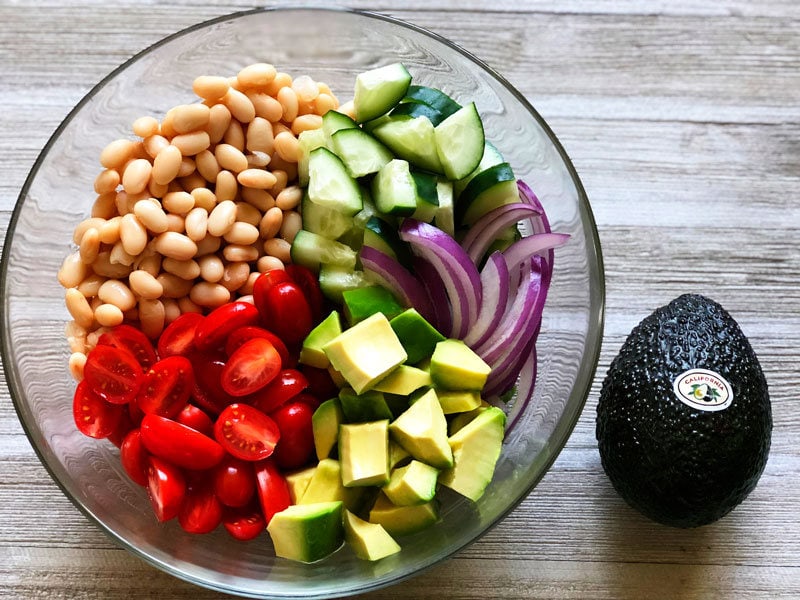
Nutrition Attributes Highlights:
- Trans Fat Free
- Cholesterol Free
- 18% DV Protein
- Good Source of vitamin B1 (15% DV), vitamin B6 (10% DV), vitamin E (15% DV), and vitamin K (15% DV)
- Excellent Source of dietary fiber (29% DV), folate (30% DV), vitamin B5 (20% DV), vitamin B3 (20% DV), vitamin C (20% DV), iron (20% DV), and potassium (20% DV)
5. The Post-Training Power Meal
The post-training meals you eat day after day are vitally important to help you not only recover, but also fuel your next training session or competition. This should be nutrient-dense good balanced diet, with mostly quality carbs, lean protein and moderate in healthy/good fats. I used farro and chickpeas for their carb and protein content. I love adding California Avocados to many of my recipes, as they are truly nutritional powerhouses and contribute nearly 20 vitamins, minerals and phytonutrients per serving. Avocados are not only full of good, fats but also contain 3 grams of fiber per serving. This California Avocado Power Bowl is the perfect recovery meal to follow a training session or competition.
Quick Tip: Farro can easily be substituted with another grain, such as quinoa, barley or brown rice.
California Avocado Power Bowl Recipe
This meatless bowl is packed full of vitamins and nutrients to keep you sustained through long days of training. A vegetarian treat that is high in fiber (100% DV) and vitamin K (220% DV). It is also an excellent source of folate (35% DV), vitamin B1 (70% DV), vitamin B2 (60% DV), vitamin B3 (80% DV), vitamin B6 (40% DV), vitamin C (35% DV), vitamin E (45% DV), iron (40% DV) and protein (56% DV).
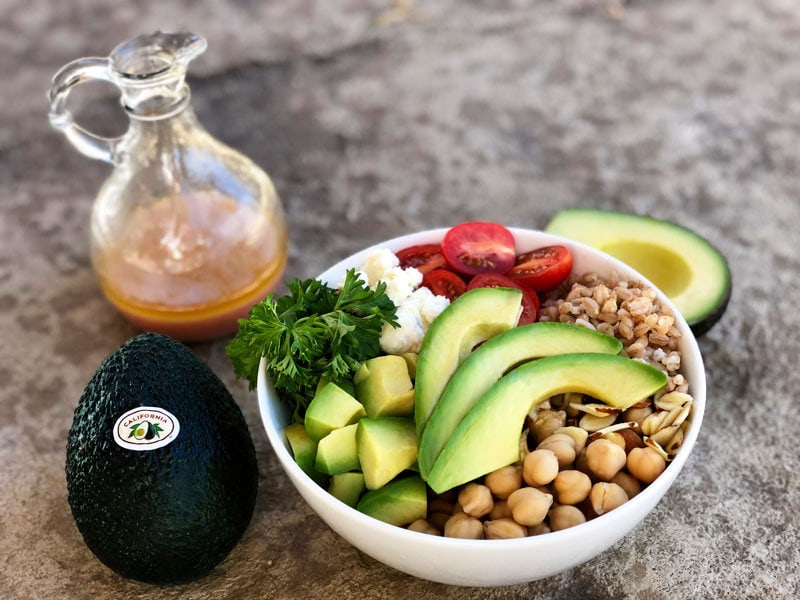
Please share your favorite way that you eat to compete!
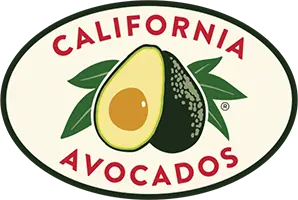
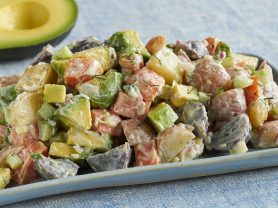
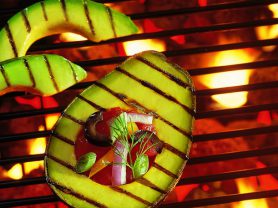
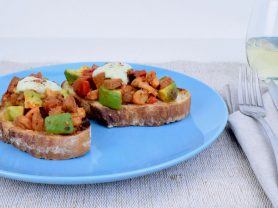
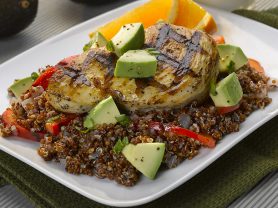
Comments